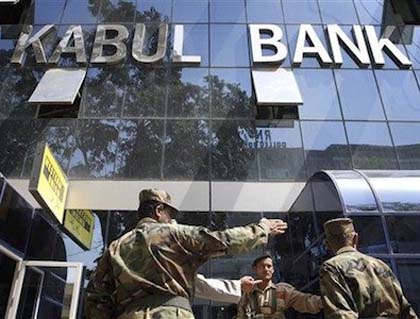KABUL - More than a year after the Afghan government seized control of the nation's largest bank because its reserves were being looted, officials have recovered less than 10 percent of the nearly $1 billion that went missing.
The crisis has jeopardized up to $1.8 billion in foreign aid earmarked for Afghanistan because many donors stopped authorizing payments after the International Monetary Fund closed its program here as a result of the scandal.
"Unless we solve the Kabul Bank issue" this fall, Staffan de Mistura, the United Nations envoy in Kabul said, "there will be financial consequences that Afghanistan cannot afford."
Kabul Bank's problems have become an irritant in the already-fraught relationship between President Hamid Karzai and his international patrons at a time when the United States is starting to draw down troops and make a case that the Afghan government is on a solid path toward self-sufficiency.
Despite demands by international donors for swift accountability, the government has yet to prosecute anyone for the widespread fraud that nearly led to Kabul Bank's collapse and exposed a large web of cronyism. Loan recipients included Abdul Haseen Fahim, the brother of the Afghan vice president, and Mahmoud Karzai, one of the president's brothers.
In July, the government detained the bank's former chairman, Sherkhan Farnood, a world-class poker player, and his deputy, former chief executive officer Khalilullah Frozi.
Neither man has been charged with a crime, but Deputy Attorney General Enayatullah Nazari said the government intends to bring them to court.
"A crime has happened," Nazari said. "They will go to the court whether they manage to secure the money or not."
Desperate to recover the missing funds, government officials in recent weeks enlisted the help of the two disgraced executives. Authorities loosened the terms of their detention and provided them with a security detail to go to a bank office on workdays and on occasion to fancy restaurants and hotels for what Nazari described as work meetings.
Nesar Ahmad Yusufzai, a spokesman for the bank office overseeing the recovery of the missing funds, said shareholders have returned $68.5 million in cash assets.
"Nine hundred million is not recoverable in one day," Yusufzai said, referring to the total amount that was unaccounted for when the bank was put in receivership. Governments put banks in receivership when they intend to liquidate them and use salvageable assets to start a new bank.
Bringing Farnood and Frozi into the office is vital, Yusufzai said.
"They know the people they distributed the loans to and they can identify them," he said. "In these types of meetings, everyone is face to face and no one can deny anything."
Abdul Hadi Khalilizad, the bank's appointed receiver, said his team has identified real estate holdings purchased with bank funds. Taking control of those will be tricky, he said, because many are abroad, including a large share in Dubai in the United Arab Emirates, where prices have dropped. "It is difficult to project how long it will take," he said.
The bank's two dismissed executives declined to speak to a reporter who visited the receivership office recently.
Afghan officials said the IMF has asked them to take certain steps, including recapitalizing the bank with government money that doesn't come from donors, in order for the fund to reinstate its program.
The Finance Ministry sought earlier this year to get parliament to approve a $73 million supplementary budget to start recapitalizing the bank.
"I feel pretty confident that the parliament will approve it based on my recent meetings with the members," the finance minister, Omar Zakhilwal, said in an e-mail.
Parliament has not formally considered the budget, however, because members have been unable to reach a quorum as they debate a separate issue, the dismissal of nine lawmakers.
Zakhilwal said the government remains committed to bringing culprits to justice.
"While it is true that there have not yet been criminal prosecutions, the complexity of the Afghan criminal justice system is such that it is critical that the cases are fully developed before formal charges are brought to ensure that the alleged perpetrators cannot get off on a technicality," Zakhilwal said in the e-mail.
Zakhilwal said the government had made "extremely good progress" in recovering assets and laying the foundation for the prosecution of those who stole. He said he was hopeful the steps would lead the IMF to restart its program and international donors to "move to commit additional funds." Special correspondent Sayed Salahuddin contributed to this report. (Agencies)

